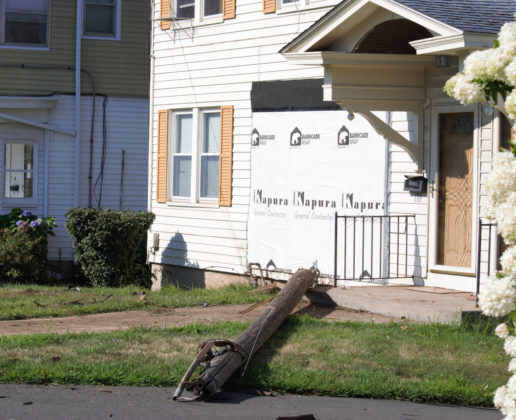 During what he called a “grueling 3 1/2 years” without a permanent address, Harry Mitchell, who recently found a place to call home, learned firsthand about the “ridiculous stigma” surrounding homelessness.
During what he called a “grueling 3 1/2 years” without a permanent address, Harry Mitchell, who recently found a place to call home, learned firsthand about the “ridiculous stigma” surrounding homelessness.
During Wednesday’s memorial service for the homeless in Hartford, Mitchell spoke about what how society treats homelessness and those who experience it. Of this problem’s cause, Mitchell said “people say it’s the system,” but it’s actually caused by “our own neighbors” who do not want shelters “in their backyards.”
These words followed a slideshow-style video that showed how some in our community live: under the Interstate, next to railroad tracks. Of their possessions shown: a toothbrush, sneakers, rosary beads.
Those who died without a permanent residence “didn’t pass away without somebody caring,” Mitchell said.
 Rabbi Donna Berman spoke about how years ago, she was asked to say Kaddish at an interfaith service for a “John Doe” because nobody could presume to know to which faith this unknown man belonged. She recalled the words shared at that memorial, which transferred appropriately to this one. Homeless men and women from Hartford were remembered by name during the service; eight passed away this year, fifteen last year.
Rabbi Donna Berman spoke about how years ago, she was asked to say Kaddish at an interfaith service for a “John Doe” because nobody could presume to know to which faith this unknown man belonged. She recalled the words shared at that memorial, which transferred appropriately to this one. Homeless men and women from Hartford were remembered by name during the service; eight passed away this year, fifteen last year.
As part of the service, four community members read homelessness narratives, lending a greater understanding to the ways people find themselves in this situation. Job loss, substance abuse, mental illness, and medical conditions were among the contributing factors described.
To mark the occasion, City Councilperson Larry Deutsch read a proclamation issued by the Mayor and City Council.
The original plan for this memorial service and action was to walk — carrying a symbolic coffin — from Charter Oak Cultural Center to the Ancient Burying Ground, where a wreath would be placed by a grave site. This would have been appropriate, given the call to make visible this issue. At the end of the memorial service, there was confusion amongst organizers as to how to proceed, with some citing the weather as a reason to change plans.
Eventually, a small group quietly walked to the Ancient Burying Ground, sans fanfare.
Not all who took part in the planning of this event were pleased with the somewhat abrupt ending to what had been an otherwise solemn and powerful service. There is talk of an event in January, which should have been described during the call to action, but was not. The call to action was abstract, urging people to do something, but beyond signing up for a mailing list, provided nothing tangible for those in attendance — the sanctuary of Charter Oak Cultural Center was full — to latch on to. There is already some talk about trying to make the procession happen at a later date, perhaps during a time of year when kindness and charitable acts are not the order of the day.
Even with the messy end to the service, something lasting, beyond memories, came out of it. Several bags of clothes, crocheted afghans, and knitted hats were collected at the event and will be donated to Church Street Eats, which opens a “clothing room” on Sundays where people on the streets and in shelters can obtain essentials.

Joanna
I was attending another event that day and was unable to make it to the memorial service. However, I looked at the weather and wondered if the procession would go on as planned. I really thought it should have. After all, people still have to LIVE on the streets during inclement weather, so why would a little rain stop anyone from marching a few blocks??
Luckily, rain does not stop the service providers who hand out food, toiletries, and services to people living on the streets.
Kerri Provost
Thanks for the comment, Joanna. The thought about what people endure overnight versus what some were unwilling to tolerate for about twenty minutes occurred to me.